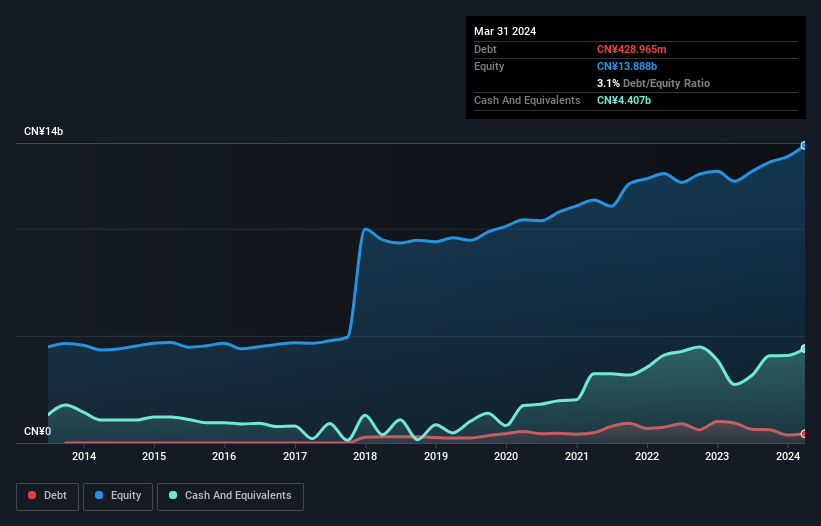
Some say volatility, rather than debt, is the best way to think about risk as an investor, but Warren Buffett famously said that 'Volatility is far from synonymous with risk.' When we think about how risky a company is, we always like to look at its use of debt, since debt overload can lead to ruin. As with many other companies Yintai Gold Co., Ltd. (SZSE:000975) makes use of debt. But is this debt a concern to shareholders?
What Risk Does Debt Bring?
Debt is a tool to help businesses grow, but if a business is incapable of paying off its lenders, then it exists at their mercy. In the worst case scenario, a company can go bankrupt if it cannot pay its creditors. However, a more frequent (but still costly) occurrence is where a company must issue shares at bargain-basement prices, permanently diluting shareholders, just to shore up its balance sheet. Of course, debt can be an important tool in businesses, particularly capital heavy businesses. When we think about a company's use of debt, we first look at cash and debt together.
See our latest analysis for Yintai Gold
How Much Debt Does Yintai Gold Carry?
You can click the graphic below for the historical numbers, but it shows that Yintai Gold had CN¥429.0m of debt in March 2024, down from CN¥933.7m, one year before. But on the other hand it also has CN¥4.41b in cash, leading to a CN¥3.98b net cash position.

A Look At Yintai Gold's Liabilities
The latest balance sheet data shows that Yintai Gold had liabilities of CN¥2.02b due within a year, and liabilities of CN¥519.4m falling due after that. Offsetting this, it had CN¥4.41b in cash and CN¥228.9m in receivables that were due within 12 months. So it can boast CN¥2.09b more liquid assets than total liabilities.
This short term liquidity is a sign that Yintai Gold could probably pay off its debt with ease, as its balance sheet is far from stretched. Simply put, the fact that Yintai Gold has more cash than debt is arguably a good indication that it can manage its debt safely.
On top of that, Yintai Gold grew its EBIT by 44% over the last twelve months, and that growth will make it easier to handle its debt. When analysing debt levels, the balance sheet is the obvious place to start. But ultimately the future profitability of the business will decide if Yintai Gold can strengthen its balance sheet over time. So if you want to see what the professionals think, you might find this free report on analyst profit forecasts to be interesting.
Finally, a business needs free cash flow to pay off debt; accounting profits just don't cut it. While Yintai Gold has net cash on its balance sheet, it's still worth taking a look at its ability to convert earnings before interest and tax (EBIT) to free cash flow, to help us understand how quickly it is building (or eroding) that cash balance. During the last three years, Yintai Gold generated free cash flow amounting to a very robust 82% of its EBIT, more than we'd expect. That positions it well to pay down debt if desirable to do so.
Summing Up
While we empathize with investors who find debt concerning, you should keep in mind that Yintai Gold has net cash of CN¥3.98b, as well as more liquid assets than liabilities. And it impressed us with free cash flow of CN¥2.3b, being 82% of its EBIT. So is Yintai Gold's debt a risk? It doesn't seem so to us. When analysing debt levels, the balance sheet is the obvious place to start. But ultimately, every company can contain risks that exist outside of the balance sheet. To that end, you should be aware of the 1 warning sign we've spotted with Yintai Gold .
If, after all that, you're more interested in a fast growing company with a rock-solid balance sheet, then check out our list of net cash growth stocks without delay.
If you're looking to trade Shanjin International Gold, open an account with the lowest-cost platform trusted by professionals, Interactive Brokers.
With clients in over 200 countries and territories, and access to 160 markets, IBKR lets you trade stocks, options, futures, forex, bonds and funds from a single integrated account.
Enjoy no hidden fees, no account minimums, and FX conversion rates as low as 0.03%, far better than what most brokers offer.
Sponsored ContentNew: Manage All Your Stock Portfolios in One Place
We've created the ultimate portfolio companion for stock investors, and it's free.
• Connect an unlimited number of Portfolios and see your total in one currency
• Be alerted to new Warning Signs or Risks via email or mobile
• Track the Fair Value of your stocks
Have feedback on this article? Concerned about the content? Get in touch with us directly. Alternatively, email editorial-team (at) simplywallst.com.
This article by Simply Wall St is general in nature. We provide commentary based on historical data and analyst forecasts only using an unbiased methodology and our articles are not intended to be financial advice. It does not constitute a recommendation to buy or sell any stock, and does not take account of your objectives, or your financial situation. We aim to bring you long-term focused analysis driven by fundamental data. Note that our analysis may not factor in the latest price-sensitive company announcements or qualitative material. Simply Wall St has no position in any stocks mentioned.
About SZSE:000975
Shanjin International Gold
Explores for, mines, and trades in precious and non-ferrous metal ores in China.
Excellent balance sheet, good value and pays a dividend.
Market Insights
Community Narratives



